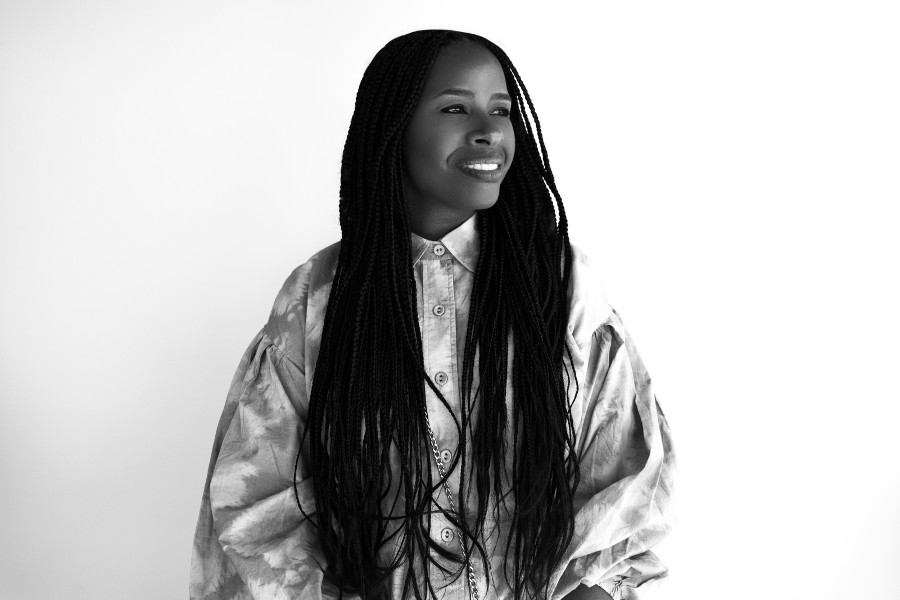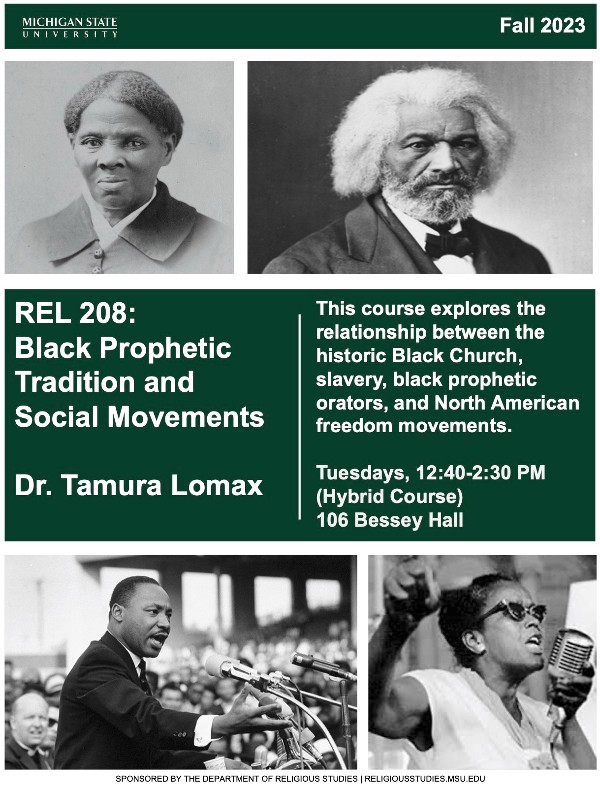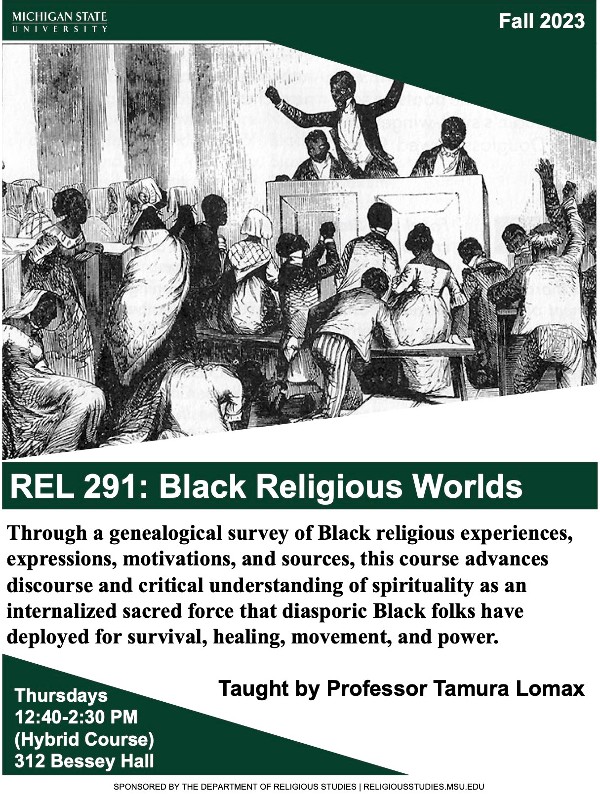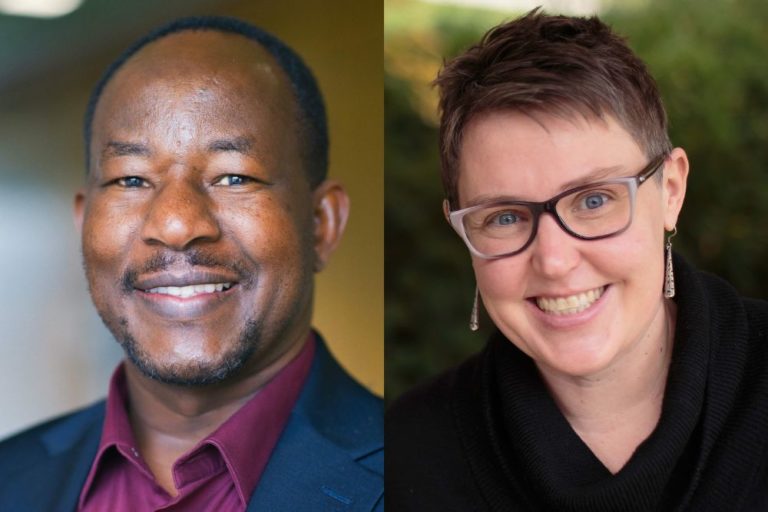From the days of slavery to the Black Lives Matter movement, religion has played an essential role in the lives of Black Americans. However, that role is often misunderstood or viewed through stereotypes of submissive slaves bowing their heads in prayer and acceptance of their fate. In reality, Black religion has evolved as a means of protest and power.
The significant impact made by Black religion and spirituality is the focus of two new undergraduate courses at Michigan State University — Black Prophetic Tradition and Social Movements (REL 208) and Black Religious Worlds (REL 291) — that are both being offered in the Fall 2023 semester.

Offered by the Department of Religious Studies, both classes were created and are being taught by Tamura Lomax, Associate Professor in the Department of Religious Studies who has a Ph.D. and M.A. in Religion from Vanderbilt University with a specialization in Black Religion and Black Cultural Studies. She also has an MDiv and a ThM from Candler School of Theology, Emory University.
Black Prophetic Tradition and Social Movements
The Black Prophetic Tradition and Social Movements class explores the relationship between the historic Black Church, slavery, Black prophetic orators, and North American freedom movements.
“This introductory course focuses on how Black religion came about, particularly Black Christianity, on slave plantations, but also how Black/African enslaved people already had multiple valuable religions, religious practices, and spiritual beliefs,” Lomax said. “We examine how those religious practices and ideas were geared towards protest within the context of oppression, and how that religious trajectory becomes a source of freedom.”

According to Lomax, slavers believed their religion would make the enslaved more docile. But while they had to appear as though they accepted what they were taught to believe in order to avoid beatings or death, many slaves were forming their own version of Christianity.
“We would not have the Black Church if the ex-slaves had internalized the Christian message of their oppressors,” Lomax said. “Many slaves took that messaging, primarily ‘slaves obey your master’ and/or the idea that enslavement was their natural lot and rejected it.”
Lomax cites Harriet Tubman and Nat Turner as examples of abolitionists whose Black Christianity was radical because it was rooted in their humanity, right to freedom, and the belief that all Black people should be free. She says that Tubman and Turner, as with many other ex-slaves, continued to follow some of their African religious practices, even as they may have rejected them. Some held that African beliefs and practices were contradictory to North American Christianity. Many others found them complimentary and necessary.
“This introductory course focuses on how Black religion came about, particularly Black Christianity, on slave plantations, but also how Black/African enslaved people already had multiple valuable religions, religious practices, and spiritual beliefs.”
“For people who did not have the law to protect them, they had to depend on multiple forms of the supernatural,” Lomax said. “They merged their African practices with Black Christianity.”
Among these practices are the belief in mysticism and spirits and the use of artifacts, such as charms. Ironically, some Black Americans today are returning to some of the religious practices and African spirituality of their ancestors. Lomax points to singer/songwriter Beyonce as a prime example of someone who merges her Black Christianity with African religious practices, which she sometimes sings about.
The Black Prophetic Tradition and Social Movements class was offered for the first time in the Spring 2023 semester and again in Fall 2023. It also will be offered in Fall 2024.
Black Religious Worlds
The other course created by Lomax, Black Religious Worlds, explores what makes religion “Black” and how Black religion and spirituality have served as a source of survival, healing, culture, resistance, and power.
“The goal of this course is to move away from caricatures of Black religion and of Black people being overly religious,” Lomax said. “It’s a more diverse examination of Black spirituality. We’re not just looking at Christianity, but also Islam, Hoodoo, Conjure, Vodou, and other Black religious organizations such as Father Divine’s Peace Mission. Black people are very spiritual people. We’re among the most religious in the country.”
While that’s true, a recent Pew Research Center survey found the number of Black Protestants who say they attend services monthly in the United States has fallen from 61 percent in 2019 to 46 percent now, the sharpest decline for any religious group. But Black Americans also have suffered a disproportionately high share of COVID-19 hospitalizations and deaths compared to white Americans.

Lomax says she’s not surprised that attendance for in-person religious services is down, especially after the pandemic, but she also notes that people return to the church in times of need.
Lomax uses her own son, a recent graduate of Morehouse College, as an example. He’s living on his own and recently started going to church, which surprised her because he, like many of his young contemporaries, has resisted attending services for a long time for a number of reasons, but especially following the high-profile killings of Trayvon Martin, Michael Brown, George Floyd, Breonna Taylor, and other unarmed Black people.
When she asked him why he was going to church, he simply said, “Because what else is there?”
“People desire to be with people from their community and their culture who give them hope and love them,” Lomax said. “Black churches are communally based. They offer spaces where people can find some sort of internal or external power.”
“The goal of this course is to move away from caricatures of Black religion and of Black people being overly religious. It’s a more diverse examination of Black spirituality.”
Politicians have long recognized the political power of the Black Church. It was the Black Church that helped propel Joe Biden to the presidency during the 2020 presidential campaign.
Lomax describes the Black Church as the largest and most significant religious body to participate in the social movement against racism. She recalls how she met with community and civil rights leaders in Ferguson, Missouri, after 18-year-old Michael Brown was fatally shot there by a white police officer in 2014.
“Guess where our meeting place was? It was the church,” Lomax said. “Who fed us? The church. Who gave us a place to rest? It was the church. I don’t think a Black social movement will thrive without the Black Church, even if that movement is rejecting some of the principles of the Black Church, which Black Lives Matter rightly did. The church is still there as an organizing body and a support mechanism. The Black Church is not just about religion, it’s about Black culture. The church may become smaller, but I don’t see it going anywhere.”
The Black Religious Worlds class was offered for the first time in the Fall 2023 semester and will be offered again in Spring 2024.
New Projects
Lomax is working on her third and fourth books, Black Girls to Women: A Black Feminist Bible on Race, Gender, and Motherhood and Black Boys to Men: A Black Feminist Bible on Liberating Motherhood, both of which are scheduled to be published by Duke University Press in 2024.
In addition to her work as a scholar and author, Lomax is a social activist and the co-founder of The Feminist Wire, an online publication committed to feminist, anti-racist, and anti-imperialist socio-political critique. Earlier this year, Harvard University purchased the “Feminist Wire Collection,” which contains about 3,000 original essays, Lomax’s papers, and more than 6,000 emails written by Lomax and other scholars on The Feminist Wire website.
“The Feminist Wire Collection” will be available for viewing and research in 2024/25 at Schlesinger Library, which is one of the special collections libraries within Harvard Library, the oldest library system in the United States. The Schlesinger Library is a leading center for scholarship on the history of women in the United States, with collections that span civil rights and feminism, health and sexuality, work and family life, education and the professions, and culinary history and etiquette.
Lomax will deliver the MSU Foglio Speaker Series on Spirituality’s Second Annual Faculty Lecture on Monday, Dec. 4, from 11 a.m. to noon via Zoom. The lecture will be on “Building Sanctuary: Spirituality, Peacemaking, and the Black Church” and will draw on Lomax’s recent scholarly work on sanctuary, or the idea of sacred, safe spaces of inclusion, empowerment, and accountability. For more information or to register for this event, go to the Collage of Arts & Letters events calendar.


